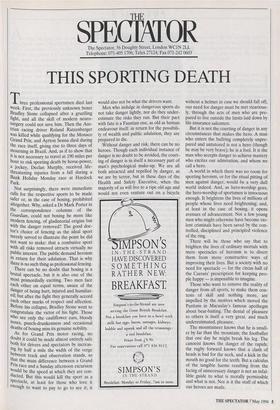The Spectator, 56 Doughty Street, London WC1N 2LL Telephone: 071-405
1706; Telex 27124; Fax 071-242 0603
THIS SPORTING DEATH
Not surprisingly, there were immediate calls for the respective sports to be made safer or, in the case of boxing, prohibited altogether. Why, asked a Dr Mark Porter in the correspondence columns of the Guardian, could not boxing be more like Modern fencing, of gladiatorial origins but with the danger removed? The good doc- tor's choice of fencing as the ideal sport merely served to illustrate the point he did not want to make: that a combative sport with all risks removed attracts virtually no public interest. The public demand heroism in return for their adulation. That is why there is no such thing as professional fencing. There can be no doubt that boxing is a brutal spectacle, but it is also one of the most primordially exciting. Two men face each other on equal terms, aware of the danger of being hurt, injured and humiliat- ed; but after the fight they generally accord each other marks of respect and affection. Before his collapse, Bradley Stone went to Congratulate the victor of his fight. Those who see only the cauliflower ears, bloody noses, punch-drunkenness and occasional deaths of boxing miss its genuine nobility. As for Grand Prix motor racing, no doubt it could be made almost entirely safe both for drivers and spectators by increas- ing by half a mile the width of the verge between track and observation stands, so that the main difference between a Grand Prix race and a Sunday afternoon excursion would be the speed at which they are con- ducted. But this would kill the sport as a spectacle, at least for those who love it enough to want to pay to go to see it it would also not be what the drivers want.
Men who indulge in dangerous sports do not take danger lightly, nor do they under- estimate the risks they run. But their pact with fate is a Faustian one, as old as human endeavour itself: in return for the possibili- ty of wealth and public adulation, they are prepared to die. Without danger and risk, there can be no heroes. Though each individual instance of danger is no doubt to be avoided, the court- ing of danger is in itself a necessary part of man's psychological make-up. We are all both attracted and repelled by danger, as we are by terror, but in these days of the Health and Safety Executive, when the majority of us will live to a ripe old age and would not even venture out on a bicycle without a helmet in case we should fall off, our need for danger must be met vicarious- ly, through the acts of men who are pre- pared to live outside the limits laid down by life insurance salesmen.
But it is not the courting of danger in any circumstances that makes the hero. A man who enters the bullring completely unpre- pared and untutored is not a hero (though he may be very brave); he is a fool. It is the man who accepts danger to achieve mastery who excites our admiration, and whom we call a hero.
A world in which there was no room for sporting heroism, or for the ritual pitting of men against danger, would be a very dull world indeed. And, as hero-worship goes, the hero-worship of sportsmen is innocuous enough. It brightens the lives of millions of people whose lives need brightening; and, at least in the case of boxing, it opens avenues of advancement. Not a few young men who might otherwise have become vio- lent criminals have been saved by the con- trolled, disciplined and principled violence of the ring.
There will be those who say that to brighten the lives of ordinary mortals with mere spectacles of heroism is to divert them from more constructive ways of improving their lives. But a society with no need for spectacle — for the circus half of the Caesars' prescription for keeping peo- ple happy — is impossible to imagine.
Those who want to remove the reality of danger from all sports, to make them con- tests of skill and nothing more, are impelled by the motives which moved the Puritans in Macaulay's famous apothegm about bear-baiting. The denial of pleasure to others is itself a very great, and much underestimated, pleasure.
The mountaineer knows that he is small- er by far than the mountain; the footballer that one day he might break his leg. The canoeist knows the danger of the rapids; the rugby forward knows that a clash of heads is bad for the neck, and a kick in the mouth no good for the teeth. But a calculus of the tangible harms resulting from the facing of unnecessary danger is not an infal- lible guide to what is morally permissible and what is not. Nor is it the stuff of which our heroes are made.


















































 Previous page
Previous page